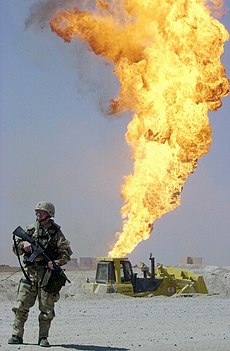
United Nations Security Council Resolution 687 was adopted on 3 April 1991. After reaffirming resolutions 660, 661, 662, 664, 665, 666, 667, 669, 670, 674, 677, 678 and 686 (1991), the Council set the terms, in a comprehensive resolution, with which Iraq was to comply after losing the Gulf War. Resolution 687 was passed by 12 votes to one (Cuba) against, with two abstentions from Ecuador and Yemen, after a very extended meeting. Iraq accepted the provisions of the resolution on 6 April 1991.

In United Nations Security Council resolution 661, adopted on 6 August 1990, reaffirming Resolution 660 (1990) and noting Iraq's refusal to comply with it and Kuwait's right of self-defence, the Council took steps to implement international sanctions on Iraq under Chapter VII of the United Nations Charter. This was the second resolution by the Security Council over the invasion of Kuwait.

United Nations Security Council resolution 1284, adopted on 17 December 1999, after recalling previous relevant resolutions on Iraq, including resolutions 661 (1990), 687 (1991), 699 (1991), 707 (1991), 715 (1991), 986 (1995), 1051 (1996), 1153 (1998), 1175 (1998), 1242 (1999) and 1266 (1999), the council established the United Nations Monitoring, Verification and Inspection Commission (UNMOVIC) to replace the United Nations Special Commission (UNSCOM). It was the final resolution adopted in 1999.

United Nations Security Council resolution 986, adopted unanimously on 14 April 1995, after reaffirming all resolutions on Iraq and noting the serious humanitarian situation with the Iraqi civilian population, the council, acting under Chapter VII of the United Nations Charter, established a mechanism whereby Iraqi oil exports would finance humanitarian aid to the country, which later became known as the Oil-for-Food Programme.

United Nations Security Council resolution 1111, adopted unanimously on 4 June 1997, after recalling all previous resolutions on Iraq, including Resolution 986 (1995) which established the Oil-for-Food Programme, the council, acting under Chapter VII of the United Nations Charter, extended the provisions of that resolution relating to Iraqi oil sales for a further 180 days to meet the humanitarian needs of the Iraqi people.

United Nations Security Council resolution 665, adopted on 25 August 1990, after demanding the full and immediate implementation of resolutions 660, 661, 662 and 664, the council authorised a naval blockade to enforce the embargo against Iraq, in the aftermath of its invasion of Kuwait on 2 August 1990.

In United Nations Security Council Resolution 666, adopted on September 13, 1990, after recalling resolutions 661 (1990) and 664 (1990) which discussed the humanitarian situation in Iraq and Kuwait and the detention of nationals from foreign countries, the Council decided to ask the 661 Committee to determine if humanitarian needs have arisen and to keep the situation under review. At the same time, it expected Iraq to comply with its obligations under international law, including the Fourth Geneva Convention, relating to the safety and detainment of third-state nationals in Iraq and occupied Kuwait.

United Nations Security Council resolution 670, adopted on 25 September 1990, after recalling resolutions 660 (1990), 661 (1990), 662 (1990), 664 (1990), 665 (1990), 666 (1990) and 667 (1990) on the topic of Iraq, the council condemned the continued Iraqi occupation of Kuwait, the violence against Kuwaiti citizens and its defiance of Security Council resolutions. It also noted the expulsion of Iraqi diplomats from several countries. As a consequence, the Council decided to impose further sanctions on Iraq, relating to civil aviation.

United Nations Security Council resolution 674, adopted on 29 October 1990, after recalling resolutions 660 (1990), 661 (1990), 662 (1990), 664 (1990), 665 (1990), 666 (1990), 667 (1990) and 670 (1990) on the topic of Iraq, the council condemned the continuing situation in occupied Kuwait after the Iraqi invasion on 2 August 1990, reaffirming the goal of the international community of maintaining international peace and security.

United Nations Security Council resolution 699, adopted unanimously on 17 June 1991, after recalling Resolution 687 (1991) and noting the report by the Secretary-General it requested, the council, acting under Chapter VII, confirmed that the International Atomic Energy Agency and United Nations Special Commission have the authority to undertake weapons inspections in Iraq and to remove, destruct or render the weapons harmless.

United Nations Security Council resolution 700, adopted unanimously on 17 June 1991, after recalling resolutions 661 (1991), 665 (1991), 670 (1991) and 687 (1991), and noting the report by the Secretary-General it requested, the council, acting under Chapter VII, the Council approved the full implementation of Resolution 687–the arms embargo against Iraq.

United Nations Security Council resolution 705, adopted unanimously on 15 August 1991, after considering a note by the Secretary-General, the Council decided that compensation paid by Iraq to the United Nations Compensation Commission arising from Resolution 687 (1991) should not exceed 30 per cent of the annual value of its exports of petroleum and petroleum products.

United Nations Security Council resolution 712, adopted on 19 September 1991, after recalling resolutions 661 (1990), 686 (1991), 687 (1991), 688 (1991), 692 (1991), 699 (1991), 705 (1991) and 706 (1991), the council, acting under Chapter VII, reaffirmed and discussed provisions of Resolution 706 and called for international co-operation.

United Nations Security Council resolution 778, adopted on 2 October 1992, after recalling resolutions 687 (1991), 688 (1991), 692 (1991), 699 (1991), 706 (1991) and 712 (1991), the council, acting under Chapter VII, decided to authorise states holding funds from the sale of Iraqi petroleum to transfer funds to the escrow account under resolutions 706 and 712, of which 30 per cent would be transferred to the United Nations Compensation Commission.

United Nations Security Council resolution 1051, adopted unanimously on 27 March 1996, after reaffirming resolutions 687 (1991), 707 (1991) and 715 (1991) on the monitoring of Iraq's weapons programme, the council approved a mechanism for monitoring Iraq's imports and exports of "dual use" items.

United Nations Security Council resolution 1143, adopted unanimously on 4 December 1997, after recalling all previous resolutions on Iraq, including resolutions 986 (1995), 1111 (1997) and 1129 (1997) concerning the Oil-for-Food Programme, the council, acting under Chapter VII of the United Nations Charter, extended provisions relating to Iraqi oil sales for a further 180 days to meet the humanitarian needs of the Iraqi people.

United Nations Security Council resolution 1153, adopted unanimously on 20 February 1998, after recalling all previous resolutions on Iraq, including resolutions 986 (1995), 1111 (1997), 1129 (1997) and 1143 (1997) concerning the Oil-for-Food Programme, the council, acting under Chapter VII of the United Nations Charter, extended provisions relating to Iraqi oil sales for a further 180 days to meet the humanitarian needs of the Iraqi people and decided to permit the import of up to 5.256 billion United States dollars in Iraqi oil and oil products, up from the previous 2 billion.

United Nations Security Council resolution 1175, adopted unanimously on 19 June 1998, after recalling all previous resolutions on Iraq, including resolutions 986 (1995), 1111 (1997), 1129 (1997), 1143 (1997), 1153 (1998) and 1158 (1998) concerning the Oil-for-Food Programme, the Council noted that Iraq was unable to export petroleum or petroleum products sufficient to produce US$5.256 billion worth of oil and authorised countries to provide Iraq with equipment to allow it to meet that sum.

United Nations Security Council resolution 1447, adopted unanimously on 4 December 2002, after recalling all previous resolutions on Iraq, including resolutions 986 (1995), 1284 (1999), 1352 (2001), 1360 (2001), 1382 (2001) and 1409 (2002) concerning the Oil-for-Food Programme, the council, acting under Chapter VII of the United Nations Charter, extended provisions relating to the export of Iraqi petroleum or petroleum products in return for humanitarian aid for an additional 180 days.

United Nations Security Council resolution 1454, adopted on 30 December 2002, after recalling all previous resolutions on Iraq, including resolutions 661 (1991), 986 (1995), 1284 (1999), 1352 (2001), 1360 (2001), 1382 (2001), 1409 (2002) and 1447 (2002) concerning the Oil-for-Food Programme, the council adjusted the list of restricted goods and procedures for its implementation under the Oil-for-Food Programme. It was the final Security Council resolution adopted in 2002.

















